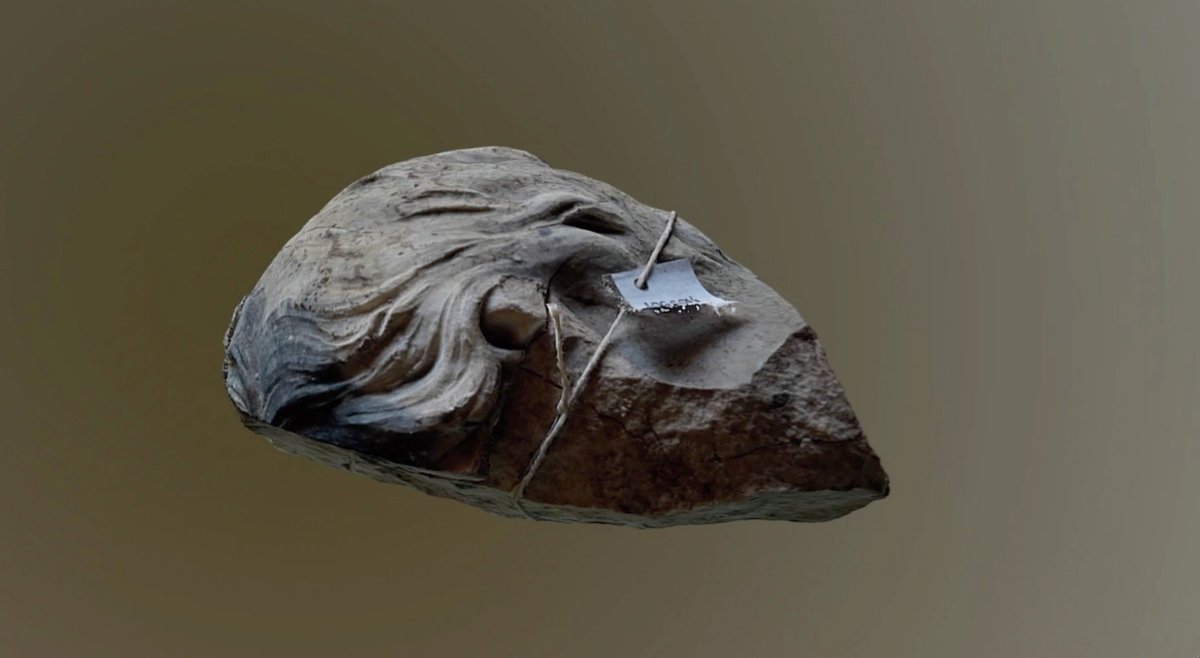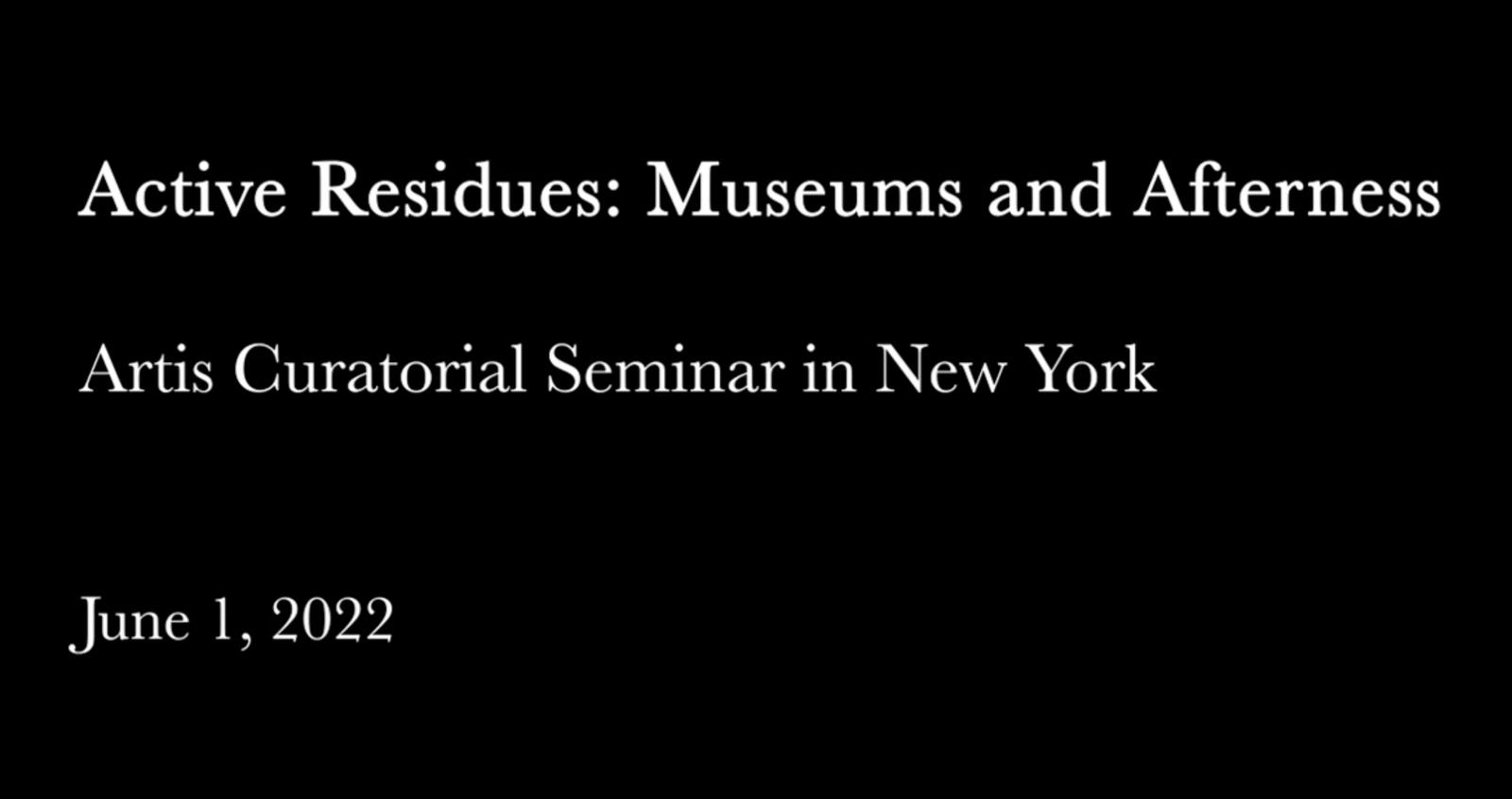
Ofri Cnaani, Leaking Lands, 2021, still from video, 22:44 min.
The starting place for Active Residues: Museums and Afterness was Leaking Lands, a three-channel video installation and performance by artist Ofri Cnaani made in collaboration with artist and dance-maker luciana achugar. The video tells the story of a fatal fire that brought an end to two centuries’ worth of treasures in Brazil’s national museum, leaving almost no digital trace. Among the few digital remains of the art objects destroyed in the fire is a photo collection made up of contributions by users via WikiCommons and a Google virtual tour, where one can easily visit the no-longer-existing museum. The video work, Leaking Lands, acts as ‘digital séance,’ where the artist uses digital remains to reimagine new sites of techno-political struggles.
The seminar explored how the removal of an object leaves behind the multiplicity of its conditions and considered the limits and implications of using digital spaces to preserve, and document traces of, physical experiences. It engaged with the proposition that although the museum’s objects no longer operate within their inherited institutional orders or colonial indexes, some of their constitutions and affordances are “dragged” with them from their original matter to the digital and information realm. Through presentations and discussion, the seminar was an invitation to think about new spaces that emerge from the entanglement of vertical institutional hierarchies and horizontal networks.
Short readings were provided to attendees ahead of the program, which informed group discussion.

Video edited by Alina Yakirevitch.
Presenter Bios
André Lepecki is an essayist and independent curator based in New York City. He is full Professor and Chairperson at the Department of Performance Studies at New York University. He received his PhD from New York University and is editor of several anthologies on dance and performance theory. He has curated festivals and projects for HKW-Berlin, MoMA-Warsaw, MoMA PS1, the Hayward Gallery, Haus der Künst-Munich, Sydney Biennial 2016, among others. He is editor of several anthologies on performance and dance theory, and author of Exhausting Dance: performance and the politics of movement (2006, published in thirteen languages), and of Singularities: dance in the age of performance (2016). In 2008, he received the Association Internationale des Critiques d’Art (USA Section) award for “Best Performance" for co-curating and directing the authorized redoing of Allan Kaprow’s 18 Happenings in 6 Parts (a commission of Haus der Kunst 2006, performed at PERFORMA 07).
Ofri Cnaani is an artist, currently living in London. She works in time-based media, performances, and installations. Cnaani is an associate lecturer at the Visual Cultures Department, Goldsmiths, University of London. Her work appeared at Tate Britain, UK; Venice Architecture Biennial; Metropolitan Museum of Art, NYC; Inhotim Institute, Brazil; PS1/MoMA, NYC; BMW Guggenheim Lab, NYC; Kunsthalle Wien, Vienna. www.ofricnaani.com
luciana achugar is a Brooklyn-based choreographer from Uruguay who grew as an artist in close dialogue with the NY and Uruguayan contemporary dance communities. Her work is concerned with the post-colonial world, searching for an undoing of current power structures from the inside out. She is a two-time “Bessie” Award recipient, a Guggenheim Fellow, Herb Alpert Award recipient, Creative Capital Grantee and a Foundation for Contemporary Arts Grantee, amongst other accolades. Most recently, in November 2021, she premiered a first iteration of her current project PURO TEATRO: A Spell for Utopia at The Chocolate Factory Theater in NYC co-presented by NYU’s Skirball Center for the Performing Arts and she received a 2022 USA Fellowship in Dance. www.lachugar.org
Roxana Fabius Rozenbaum is a Uruguayan curator and art historian. She currently lives and works in New York City and serves as Executive Director at A.I.R. Gallery, the first artist-run feminist cooperative space in the U.S. During her tenure at A.I.R., she has organized programs and exhibitions with Gordon Hall, Elizabeth Povinelli, Jack Halberstam, Che Gosset, Regina José Galindo, Lex Brown, Kazuko, Howardena Pindell, and many others. She has also organized programs and exhibitions at the Judd Foundation, NYC, The Park Avenue Armory, NYC, The Hessel Museum, New York, Caixa Forum, Barcelona, Zona Maco, Mexico D.F., Art Port, Tel Aviv, Centro Cultural de España, Montevideo, and Museo Zorrilla, Montevideo. Her research is focused on the intersection of aesthetics, art, design, technology, and feminist theory.
Sara Reisman is Chief Curator and Director of National Academician Affairs at the National Academy of Design in New York City. A curator, educator, and writer, Reisman most recently served as the Executive and Artistic Director of the Shelley & Donald Rubin Foundation (2014-2021), Director of New York City’s Percent for Art Program (2008-2014), Associate Dean of the School of Art at the Cooper Union (2008-2009), and Curatorial Consultant for Public Art at the Queens Museum (2009). Recently curated exhibitions have been realized at the National Arts Club in New York City (2022), the Hugh Lane Dublin City Gallery (2021), and Futura Gallery in Prague (2020). She has been awarded residencies by Art Omi, Foundation for a Civil Society, Artis, CEC Artslink, Futura, and the Montello Foundation. Reisman has taught art history and contemporary art at the University of Pennsylvania, SUNY Purchase School of Art + Design, and, since 2016, at the School of Visual Arts’ Curatorial Practice Master’s Program.